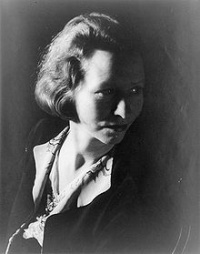Difference between revisions of "Edna St. Vincent Millay"
| Line 25: | Line 25: | ||
* [[Notable LGBTQ Playwrights]] | * [[Notable LGBTQ Playwrights]] | ||
* [[Pulitzer Prize Winning LGBTQ Authors and Poets]] | * [[Pulitzer Prize Winning LGBTQ Authors and Poets]] | ||
| + | * [[Feminist Activists Who Identify as Lesbian, Bisexual or Transgender]] | ||
==Further Reading/Research== | ==Further Reading/Research== | ||
Latest revision as of 14:31, 7 April 2020
Contents
[hide]Country
United States
Birth - Death
1892 - 1950
Occupation
Poet
Notable Achievements
Pulitzer Prize
Description
Lyrical poet and playwright. Noted for both her dramatic works, including 'Aria da capo', 'The Lamp and the Bell', and the libretto composed for an opera, 'The King’s Henchman', and for such lyric verses as “Renascence” and the poems found in the collections 'A Few Figs From Thistles', 'Second April', and 'The Ballad of the Harp-Weaver', winner of the Pulitzer Prize in 1923. Frank portrayal of homosexuality in her poems. Bisexual, who scandalized the nation with her relationships at the time. Created the phrase 'My candle burns at both ends'. In 1943 Millay was the sixth person and the second woman to be awarded the Frost Medal for her lifetime contribution to American poetry. Feminist. Used the pseudonym Nancy Boyd in her writings.
See Also
- Notable LGBTQ Playwrights
- Pulitzer Prize Winning LGBTQ Authors and Poets
- Feminist Activists Who Identify as Lesbian, Bisexual or Transgender

